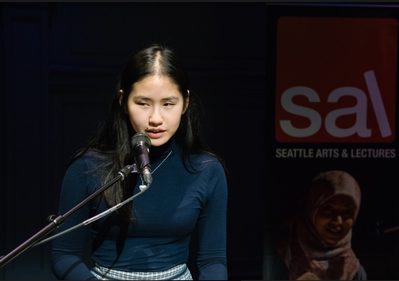|
By Anya Shukla Sometimes, Marina Chen wakes up in the middle of the night, a fragment of a poem in her head; she keeps a notebook by her bed specifically so she can write down her midnight thoughts. It’s safe to say she constantly thinks about the art form. Chen’s passion began in elementary school, where she first wrote short stories and narrative fiction. It has only been recently—in the past two years—that she’s moved towards poetry, which she characterizes as “like philosophy, but also very beautiful.” Chen enjoys the challenge of condensing the imaginative world of fiction into poetry’s concise structure and often stretches her boundaries by experimenting with different forms. Chen admits that, no matter how hard she tries, she always writes love poetry. Nevertheless, “it’s not always romantic; it’s often dedicated to something,” she noted. Once she finishes a piece, she puts it away, returning to the poem after a few weeks. If she still sees value in it, Chen said, she knows it was her “truest thought.” Only then will she submit her work to publications or contests. As a result of diligent work, Chen has quickly grown her poetry skills, to the point where she was a Finalist for Seattle’s 2019/20 Youth Poet Laureate (YPL). Because of her achievement, she had the chance to read poetry in Seattle bookstores, libraries, and events alongside fellow YPL Cohort members. Chen characterized the YPL community as genuinely diverse, not just in terms of race, but with regard to socioeconomic status, sexual orientation, hobbies, and more. This, in turn, allowed her to better her own work: “You breed off each other’s authenticity.” Although many view poetry as a solitary activity, Chen found a strong, supportive literary community through YPL: “It was an encouragement to keep writing despite how busy life gets.” At the same time, however, Chen often grapples with imposter syndrome. As a Chinese-American, she experiences an implicit pressure to pursue STEM rather than the arts; because of this, she worries her work isn’t good enough to continue as a writing major in college. Luckily, Chen’s family is supportive of her poetry, but their encouragement isn’t always enough to dispel her fears: “It is harder to make a living,” she said. “I’m worried about the uncertainty of it.” Furthermore, Chen feels she has to, as she described it, “prove her authenticity” as a Chinese-American through the subject matter of her work; “I think, Am I writing enough about my race? Or if I am, Can I do better?” “There’s a pressure to use your culture… to put that into your work,” she noted. “Even when that’s not the most natural.” Especially when crafting a writing sample, she struggles: “Sometimes I feel my writing isn’t Chinese enough.” Unfortunately, in the literary world, many people of color are relegated to solely writing about their race. While Chen acknowledges that more cultural viewpoints must be expressed through literature, she pushes back against the narrative that, as a Chinese-American, she can only write about her racial identity. “I’d rather there not be a division between people who are expected to write about their race and people who are not,” she said. As she continues writing, Chen hopes to incorporate both her Chinese and American identity in her work, rather than focusing just on her Asian heritage: “I want to become true enough to myself as a writer to be able to merge them,” she said. “I want to take into account my culture, but also make it my own.” Later, as she becomes a mentor for younger artists, she wishes to instill this same knowledge in them. To that end, Chen emphasizes that “you can be whatever you want to be. You don’t have to write about your race all the time.” No one should force themselves to create art based on what others deem important. Instead, she advocates, “Let your own true self forward.”
0 Comments
Your comment will be posted after it is approved.
Leave a Reply. |
Archives
February 2023
Categories
All
|

 RSS Feed
RSS Feed